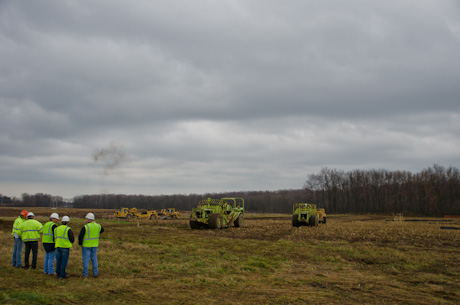Haskell and Pepsi say they are hiring local workers and are pledged to hiring local workers
The Haskell Company, general contractor on Project Wave, and PepsiCo both pledged today to hire, whenever possible, local subcontractors, and say they've been following that practice from the beginning.
In fact, both companies say they have a non-binding agreement with the Genesee County Economic Development Center to hire local workers.
Union representatives from Rochester held a press conference today outside the building site at the Genesee Valley Agri-Business Park and insisted that Haskell is not awarding enough contracts to builders from Western New York.
Dave Young, president of the Rochester Building and Construction Trades Council, as well as business manager of IBEW Local 86, told reporters to just walk through the parking lot (if allowed) and check license plates on the trucks pulled up behind the construction trailers.
"Pepsi has hired an out-of-state general contractor who is bringing up employees from Texas, Florida, North Carolina and Virginia," Young said. "They're bringing them from everywhere but right in here New York State."
Young made his remarks flanked by union members -- Young said he represents 15,000 workers, 15 percent of whom are out of work -- and in front of a backdrop of earth movers grading the construction site.
The earth movers are owned and operated by Zoladz Construction, based in Alden.
Young (pictured) said the one solid piece of evidence his group has is a video he and some colleagues produced yesterday during their walk-through of the construction site parking lot.
When pressed to name out-of-state contractors who have been awarded contracts, Young named one, an electrical contractor out of Kentucky, but said he couldn't remember the names of the others.
He said the bid process for construction work such as this lacks transparency, which makes it hard to know for sure who is being hired for what jobs.
Yesterday, Steve Hyde told The Batavian that 50 percent of the contracts for the project have been awarded and 80 percent of those have gone to Western New York contractors.
Dave Balz, a VP with Haskell, said he didn't have the information in front of him to be able to confirm Hyde's numbers, but said Haskell is firmly committed to hiring local labor on all of its projects.
"In my experience, every community is concerned about the local work force and the local workers," Balz said. "We respect that concern. Local contractors with a good safety record are always welcome to bid on our projects."
Haskell signed a non-binding agreement with GCEDC to hire qualified subcontractors from the local area (which covers Genesee County as well as the surrounding counties), Balz said.
According to Scott Gilmore, a spokesman for Pepsi, the company signed a "local labor pledge" with GCEDC.
"Our pledge is to use a fair and competitive selection process for the construction of the new manufacturing facility, with a view to using as many New York State and local subcontractors and suppliers as reasonable," Gilmore said in a statement.
"As with any pledge of this nature, it is not legally binding, but it is a reflection of the goals and standards we seek to maintain as we proceed with development of the state-of-the-art dairy and yogurt production facility in Batavia, New York."
Gilmore also wrote, "We are committed to providing a measurable, positive impact to the Upstate local community and surrounding areas through the use of available, competitive local labor as we construct a state-of-the-art dairy and yogurt production facility in Batavia, New York."
Among Young's request is that GCEDC create a local labor requirement in its contacts with businesses, saying that the Monroe County IDA has such a requirement in its contracts.
The Batavian spoke briefly with a spokeswoman for COMIDA who said at first the claim was true, but when asked if such agreements were binding, she said she would need to double check. We've not yet heard back from her.
As for the video presented by the union, Balz said he would let it speak for itself, adding, "We are still early in a very long-term project to build a state-of-the-art yogurt plant. As things proceed on site, we intend and will take action on our pledge to do our very best to include local participation."
Previously: Union officials making waves over alleged out-of-state hiring practices of Wave Holding


